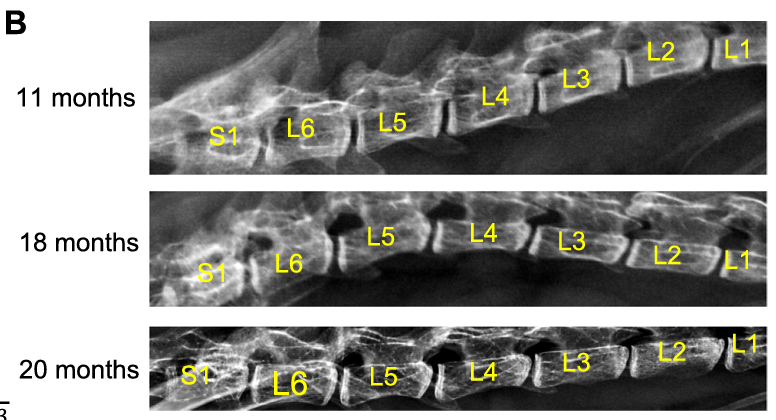Loss of Lumbar Disc Height with Age and its Impact on Pain
03 Jun 2023

Interesting title don’t you think? I thought so. I was scrolling through the contents of a journal article and found this little nugget. At first I thought, “yah, but it’s a human journal, it won’t really be applicable to a quadruped.” But, lo and behold, it was a study on mice! Well then, I thought, “Read on!”
Here’s the citation:
Vincent KF, Bundock J, Dona CPG, et al. Loss of lumbar disc height with age and its impact on pain and sensitivity associated behaviors in mice. Eur Spine J. 2023 Mar;32(3):848-858.
What did they do?
They took x-rays of 77 mice between the ages of 3 and 23 months of age to look at their lumbar disc heights. Then they collected data on behavioural measures which included rearing and distance travelled in an open field test; time spent in rearing, reaching, immobile, and self-suspended in the tail suspension test; bilateral hind paw licking in response to cold allodynia using acetone; and unilateral hind paw licking in response to heat hyperalgesia using capsaicin.
And what did they find?
1. Lower lumbar discs lose height with age. These changes are independent of body composition measures including body weight, bone mineral density, fat mass, lean weight mass, percent fat mass, and percent lean mass.
2. Better (or more normal) disc height correlates with rearing and mobility in the open field test, immobility in the tail suspension test, and thermal hyperalgesia.
3. Less disc height correlates with cold allodynia and rearing in the tail suspension test.
Thoughts?
Well, if we interpret this to mean that discs degenerate / lose height as an animal ages, and that the loss of disc height results in pain and a reduction in movement. Could we not then just as easily say that therapies directed towards pain and improved disc health would be beneficial for the quadruped patient? I’d say so!
There you go, short and sweet. Knowledge all wrapped up in a neat and tidy package!
Until next time, Cheers!

